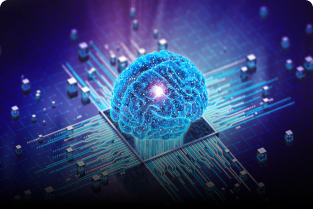Artificial Intelligence (AI) has transformed how we live, work, and interact with technology. From personalized recommendations to autonomous vehicles, AI’s impact is evident across industries. But what does the future hold for this revolutionary technology? As we look ahead, here’s a glimpse into the exciting possibilities and challenges AI might bring in the coming years.
1. Ubiquitous Integration in Daily Life
AI is poised to become an integral part of everyday life. Smart assistants like Siri and Alexa will evolve into even more intuitive companions, capable of understanding emotions and responding contextually. AI-driven devices will seamlessly integrate with our homes, cars, and workplaces, enhancing convenience and productivity.
Examples:
- Advanced home automation systems powered by AI.
- Wearable technology offering personalized health insights.
2. Breakthroughs in Healthcare
The future of AI in healthcare is groundbreaking. AI will play a pivotal role in diagnosing diseases, developing personalized treatment plans, and even predicting health issues before symptoms arise. Innovations in AI-powered robotics will revolutionize surgeries and patient care.
Potential Developments:
- Early cancer detection through AI-driven imaging tools.
- AI systems assisting in drug discovery and development.
3. Revolutionizing Education
AI will reshape education by offering personalized learning experiences tailored to individual needs. Virtual tutors and AI-powered adaptive learning platforms will help students grasp complex concepts at their own pace, bridging gaps in traditional teaching methods.
Future Education Trends:
- AI-driven virtual classrooms for global access to quality education.
- Real-time feedback systems to improve student engagement.
4. Autonomous Transportation
Self-driving cars and AI-enabled transportation systems will redefine mobility. Beyond personal vehicles, AI will optimize public transportation, reduce traffic congestion, and enhance road safety.
What to Expect:
- Fully autonomous taxis and delivery vehicles.
- AI-powered traffic management systems to minimize accidents.
5. Transforming Business and Industry
Businesses will harness AI for better decision-making, improved customer experiences, and streamlined operations. AI will dominate areas like supply chain optimization, predictive analytics, and customer service.
Key Trends:
- AI chatbots providing human-like customer support.
- Predictive analytics for inventory and demand management.
6. Advancements in Robotics
AI-powered robots will take center stage in manufacturing, logistics, and even household chores. Collaborative robots, or cobots, will work alongside humans, increasing efficiency and reducing workplace hazards.
Future Innovations:
- Robots performing complex surgeries or high-risk rescue operations.
- AI companions for elderly care and social interaction.
7. Ethical and Societal Implications
While AI offers immense benefits, it also raises critical ethical concerns. Issues like data privacy, bias in AI algorithms, and job displacement need careful attention. The future of AI will hinge on creating fair, transparent, and accountable systems.
Challenges Ahead:
- Addressing biases in AI models.
- Ensuring equitable access to AI technologies.
8. Expansion of AI in Creative Fields
AI’s role in creativity will continue to grow, from generating art and music to crafting compelling stories. While it will never fully replace human creativity, AI will augment artistic processes and inspire new forms of expression.
Creative AI Applications:
- AI-generated music tailored to individual moods.
- Tools for designing graphics, videos, and virtual environments.
9. Enhanced AI-Human Collaboration
Rather than replacing humans, AI will amplify human capabilities. By handling repetitive tasks, AI will allow professionals to focus on strategic and creative endeavors, fostering a more collaborative dynamic.
Collaborative Scenarios:
- AI assisting doctors in analyzing medical data.
- Designers using AI tools to prototype faster and more efficiently.
10. The Road to General AI
While current AI systems are narrow in scope, the pursuit of Artificial General Intelligence (AGI) continues. AGI aims to create machines capable of reasoning, learning, and performing any intellectual task a human can. Though AGI is still in its infancy, its realization could redefine the boundaries of technology.
Conclusion
The future of AI is brimming with possibilities. As technology advances, AI will continue to reshape industries, solve complex problems, and enhance human lives. However, it also demands ethical frameworks and global cooperation to ensure its benefits are shared equitably.
As we navigate this evolving landscape, one thing is clear: AI will be a defining force in shaping the future. The question isn’t just what AI will do for us but how we will guide its growth for the greater good.

